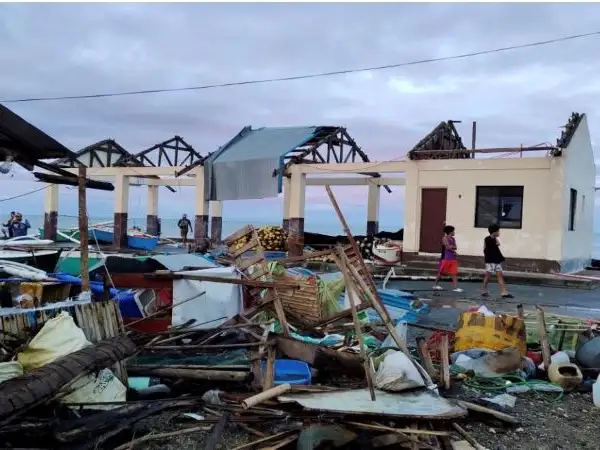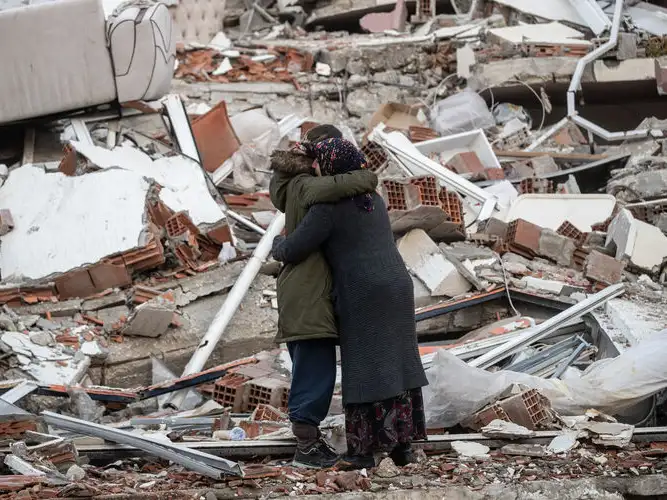

Maasin, the capital of the province of Southern Leyte, was one of the areas hardest hit by Typhoon Rai (known locally as Typhoon Odette). Photo credit: Caritas Maasin.
Typhoon Rai (known locally as Typhoon Odette) made landfall in the Philippines on 16 December 2021, causing widespread damage.
This disaster comes just a week after a series of destructive typhoons struck communities, destroying homes, collapsing roads and cutting off vital power supplies. Families who were already struggling from those storms now face yet another devastating crisis.
What happened?
A strong magnitude of 6.9 struck the central Philippines on 30 September at 10pm local time.
The province of Cebu has suffered the greatest devastation and has now declared a state of calamity. This is an official recognition of the scale of destruction and disruption facing local communities.
At least 69 people have sadly died, most from the small town of Bogo. Rescuers continue to search desperately through the rubble for survivors, while authorities rush to deliver urgent aid.
The Philippines is prone to disasters triggered by natural hazards and dangerous tropical storms – a situation made so much worse by the climate crisis.
How has it affected communities?
Thousands of families are still working to recover from the devastating impact of powerful typhoons (severe tropical storms) that only hit last week. These storms have already destroyed homes, cut off electricity and left communities without accessible roads.
Now, many of these same communities have been struck again by the earthquake. Roads have cracked and bridges have collapsed, making the delivery of life-saving aid even more difficult.
What are we doing to help? And what can you do?
Local church agencies are currently assessing the situation in the aftermath of this disaster, and establishing the needs of communities. As part of Caritas Internationalis we stand ready to respond to any requests for support.
We invite you to please keep families in the Philippines in your prayers through these difficult times.
We know our local experienced Caritas partners will be on the ground to provide immediate humanitarian assistance - doing all they can to support families in need
Local Church response
Our local Caritas sister agency, Caritas Philippines, closely monitored the situation and coordinated with the dioceses along the path of the typhoon.
Power lines were damaged, uprooted trees blocked roads, and flood waters remain high for a long time in some areas - making communications challenging. Initial reports and assessments from local dioceses showed there were urgent needs for:
Drinking water
Food packages
Hygiene kits
Temporary shelter for people who have lost their homes
Support to repair damaged homes.
CAFOD has given £40,000 to support Caritas Philippines in their response, helping provide urgent humanitarian assistance to those affected by Typhoon Rai.
In a country where 80 per cent of people are Catholic, local churches have played a crucial role in helping people prepare for typhoons.
Rhea Tariq, CAFOD’s Head of Humanitarian Response, said:
“The Filipino people are facing up to yet another terrible storm. Our thoughts and prayers are with them at this time.
"We know our local experienced Caritas partners will be on the ground to provide immediate humanitarian assistance - doing all they can to support families in need.”
Typhoons in the Philippines
The Philippines is hit by around 20 typhoons per year - but some recent storms have been particularly devastating.
In 2013, Typhoon Haiyan struck the Philippines, destroying homes, livelihoods and killing over 6,000 people.
In November 2020, the Philippines was hit by two record-breaking typhoons that caused widespread destruction.
Good preparation can help to limit their impact. One positive legacy of Typhoon Haiyan is that the Philippines government and our Church partners have become better prepared for disasters.

Join us today with a monthly donation
Helping in emergencies needs all of us. Before, during and after a crisis, our local experts are working in their own communities to help families prepare, survive and rebuild.
With more emergencies than ever, there has never been a greater need for us to put our faith into action, together.
Please join us today with a monthly donation to our emergency response work. You can also sign up to receive prayer texts for when there is an emergency.

